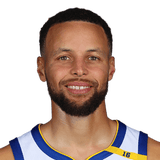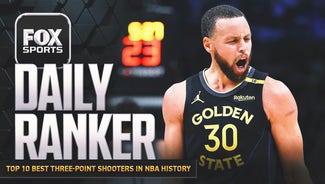
What's next for the Warriors? A new Curry deal, Durant taking less money and ring chasers
The Warriors have already done the heavy lifting, and after winning a second title in an unmatched three-year span of success, Golden State will head into the 2017 offseason looking to solidify its place as the NBA's latest dynasty.
If this offseason goes to plan, the Warriors' core four should be together at least another two years — Klay Thompson can become a free agent after the 2018-19 season, but it is going to take some creative general managing and a sacrifice from the Warriors' latest addition to that core, Kevin Durant, to keep Thompson.
Golden State was able to sign Durant last year because of a massive jump in the NBA's salary cap following the influx of money from a new television deal. That kind of influx — upward of $20 million — isn't going to happen again, and Durant is expected to not pick up his player option this summer, making him a free agent along with Stephen Curry.
Now, by the letter of the law, the Warriors could lose both Durant and Curry this summer, but that's not expected to happen.
Still, if Durant doesn't take less money than he could demand from the Warriors, Golden State is likely to see important players outside of that core four leave.

Curry is going to sign the largest contract in NBA history this summer. He has played for well below market value for the last three seasons — winning two MVPs on a four-year, $44 million deal. Now, he's set to sign a new Designated Player Veteran Contract, which will be worth around $205 million over five years — a deal that beats any that another team could offer by roughly $75 million.
Curry is going to get paid this offseason, but while his new deal with the Warriors is inevitable, it will likely to be the last domino to fall this July.

Before the Warriors can re-sign Curry, they have to re-sign Durant.
The NBA Finals MVP is, again, expected to opt out of the 1-and-1 deal he signed last offseason. The Warriors do not have Bird rights on his deal, nor can they offer him a DPVC. If Durant wants to make the most money possible next year, it creates a big problem for Golden State, as the team will have to get under the salary cap to re-sign him.
But if Durant accepts a non-Bird max contract from the Warriors — which would be a 20 percent raise from the $26.5 million he made this year ($31.8 million) — the Warriors won't have to go below the salary cap to re-sign him.
That's huge because if you recall last year, the Warriors had to renounce the cap holds of their entire team to create enough cap space to sign Durant. If they had to do that again this year, they would be forced to renounce key reserves Andre Iguodala and Shaun Livingston.
But if Durant signs the non-Bird extension, the Warriors can operate as an above-the-cap team and use their Bird rights on both Iguodala and Livingston to re-sign them.
Then, after that, they can re-sign Curry to his massive contract.
Durant likely would be sacrificing $3.5 million on next year's deal, but such a sacrifice would keep not only the Warriors' core together but also maintain important role players on a championship team. And all accounts, Durant is keen to make that sacrifice.
He knows it takes more than four to win a title — no matter how good those four are.

After re-signing Durant, Golden State will go into the ring-chaser market.
The Warriors, despite being over the cap, will be able to fill out their roster with minimum-salary players, and you can imagine that there will be plenty of players interested in taking a pay cut to play in Oakland.
The Warriors, of course, would like to keep their current roster in place, but that's going to be a tall order.
A key to their offseason will be to convince David West, who was a rock-solid backup big man for the team on a minimum contract this season, to return for another year on a minimum deal. Centers Zaza Pachulia and JaVale McGee will both be free agents as well, and both are likely to get better financial offers elsewhere this summer. Small forward Matt Barnes should be an easy re-sign — if the Warriors are interested in him returning.
One player who is almost assuredly leaving this summer is reserve guard Ian Clark — the Warriors would need to use a tax-payer midlevel exception to keep him, but given the emergence of Patrick McCaw, such a designation seems unlikely.

The Warriors do not have any draft picks this summer, either, but that doesn't mean that they won't be able to add a young player or two in the draft. The Warriors bought a second-round pick from Milwaukee in last year's draft and selected McCaw.
But that's small potatoes — the key to this summer for the Warriors is retaining Curry, Durant, Iguodala and Livingston, which would, in turn, keep the Warriors' dynasty train rolling.




